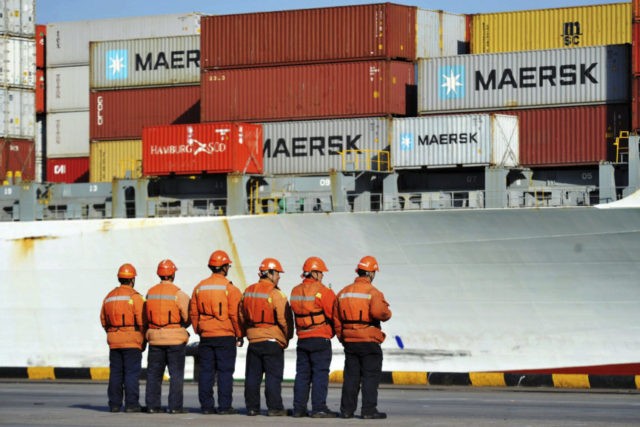North Korean products and workers reportedly began flowing into China at an accelerated rate following dictator Kim Jong-un’s meeting with American President Donald Trump last week, and China has apparently begun lifting a ban on Chinese tourism to the fellow communist regime Tuesday – indications that China expects sanctions on North Korea to soon lift.
South Korea’s Chosun Ilbo newspaper reported Tuesday that China has “virtually lifted a ban on travel to North Korea” in recent days, allowing travel agencies to book passengers for travel to the government. Several travel agencies have begun advertising not just flights and train rides into the country, but tours of some of its major sites, including the heart of Pyongyang. Panmunjom, the border village where Kim met South Korean President Moon Jae-in, may also soon become a tourist attraction for the Chinese. Chosun adds that Air Koryo, North Korea’s national airline, is expected to launch regular flights to China again at the end of the month.
It specifically notes that the United Nations sanctions do not ban individual travel to North Korea, so this measure is not a violation. China independently banned tourism to the country shortly after the United States did last year. Yet a tourism influx will almost certainly weaken the effect sanctions are intended to have on the Kim regime: to weaken the economy enough to bring North Korea to the negotiating table on its illegal nuclear weapons program. Chosun reports that estimates suggest 90 percent of tourism revenue to North Korea, up to $43.62 million a year, comes from China.
While tourism activity may not violate sanctions, reports of a growing presence of North Korean products in the Chinese border market may arouse suspicion that China is not imposing the United Nations sanctions strictly enough. The news service UPI reported Monday that Dandong, a Chinese border city, has seen an influx of cheap North Korean labor and a variety of produce products that had disappeared from markets shortly after sanctions passed. Trafficking in North Korean products, the outlet claimed, was “vibrant” in Dandong, fueled by large freight trucks bringing in people looking for work as well as North Korean “honey, berries and mushrooms.”
“Here you can hire a North Korean worker for one-third of the money paid to a Chinese worker,” one Chinese business owner told UPI. “Half the wages they earn goes to the North Korean government, the rest goes to paying fees, they are then only left with a few bills of foreign currency.”
North Koreans are easily identifiable by the badges they wear representing the Kim cult, UPI notes.
A similar report appeared in Radio Free Asia (RFA) last week, citing traders and other sources in Dandong.
“In the past, when a truck driver got caught bringing restricted items on the sanctions list, the truck was impounded for a day and could only pass through the border if a fine was paid,” an anonymous source told RFA. “These days, those kinds of trucks [smuggling restricted goods] are fined, but can go through customs right away.”
By fining the trucks, China may be looking to technically be able to maintain that it is enforcing sanctions on North Korea. Yet the source said that about half of the trucks coming through are not being checked at all. The result has been that those attempting to smuggle North Korean items into the country have gotten bolder about trying.
Japan’s Mainichi Shimbun found a similar situation in the provinces of Jilin and Liaoning, also on the border with North Korea.
“Residents on both sides are starting to anticipate a loosening of sanctions after the summit between U.S. President Donald Trump and North Korean leader Kim Jong Un,” the newspaper reported, citing a higher number of North Korean workers attempting to find local short-term labor opportunities in the past two months.
While reports note that the enforcement of sanctions and limits in travel on the border appear to have decreased significantly since the Trump-Kim summit. RFA noted that sources said that the most visible change was before and after Kim Jong-un’s visit to Beijing in March. “At that time, North Korea stopped repatriating workers it had based in China to generate foreign currency for the Kim regime, and even dispatched some additional workers to the country,” according to RFA’s sources.
Kim Jong-un has made three trips to China: one to Beiing in March, one to Dalian in May, and one beginning Tuesday once again to the capital. Kim is expected to brief Communist Party leader Xi Jinping on his discussion with President Trump last week in Singapore.

COMMENTS
Please let us know if you're having issues with commenting.